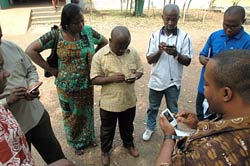Experts try to predict the future apps of mobile health
November - December, 2009 | Volume 8, Issue 6
Much of the debate in health technology centers on the future of mobile health research and health care delivery. There are many nascent technologies on the horizon, as well as accompanying obstacles that policymakers, corporations, health workers and other stakeholders are confronting.

Photo courtesy of DataDyne.org
Developing synergy between nongovernmental
organizations, corporations and ministries of health
and finance in low-resource countries will be key
to the long-term sustainability of mobile health
programs such as this one in Ghana.
A number of cutting-edge devices, computer programs and creative strategies were recently unveiled at the mobile health summit, many of them based on the idea of expanding the capabilities of existing phones. A new technology that offered a possible glimpse of the future was a Microsoft program designed to make standard cell phones, or "dumb" phones, smarter.
Meanwhile, social networking software added to a cell phone based distance learning program encourages collaboration among research fellows in remote parts of India, said Dr. Mary Lee from Tufts University.
Other experts promoted the idea of moving away from standard cell phones to completely new, smaller devices. Clint McClellan, from the wireless technology corporation Qualcomm, emphasized the importance of small, low-cost or disposable devices in mobile heath. Showcasing the world's smallest phone on a chip and a disposable biometric patch meant to be worn, he described the devices as mere gateways to medical data.
The importance of establishing metrics to measure impact was identified as a necessity for moving forward. "Some may be related to process, some may be related to outcomes," said Dr. Barbara Mittleman, director of the NIH's public-private partnerships office. "But we especially need to understand the impact of our programs."
Questions about the sustainability and scalability of the mobile platforms must be addressed, along with concerns about compatibility among various operating systems. Though many of the programs showcased were innovative, some were regarded as potentially lacking interoperability with other platforms. One of the many compatibility issues discussed was the tendency of cell phone and PDA manufacturers to require specialized chargers for their devices.
Some pilot programs were seen as technically innovative, but not well-suited for large-scale implementation, because of cost, logistical concerns or copyright issues. Some projects involved the use of both open-source and copyrighted software, making them less attractive options for some countries. Dr. Scott Ratzan, a former global health technical adviser at the U.S. Agency for International Development and now vice president of Johnson & Johnson's global health division, offered a simple solution, "If you don't have a good business plan, don't do the pilot."
Security, privacy and other ethics-related issues are also emerging as mobile health platforms become more commonplace. Market forces and secure management of data often work against one another, and cell phones, despite their amazing potential for health data transmission and management, remain insecure platforms. Dr. Eric Rasmussen of Innovative Support to Emergencies, Diseases and Disasters pointed out that with millions of cell phones recycled annually and many villages sharing phones, underserved populations are especially at risk for the theft or misuse of medical data. Despite the security risks, however, most experts agree patients in low-and middle-income countries would most likely prefer the benefits of mobile health over secure data.
Greater synergy between nongovernmental organizations, corporations and the ministries of health and finance in target countries is perhaps the most vital requirement for the success of mhealth programs. Without that, sustainability is impossible, said Dr. Julia Royall of the NIH's National Library of Medicine. "There are too many projects that come into Africa, where I work for example, where people come in with good intentions, tools get shared and some good things happen, and then they leave."
"I would hope that you get the ministries of health of developing countries involved, as well as the ministries of finance, who make those financial decisions," she advised. "That way the wonderful stuff you're doing can be really integrated into how that country does its health business."
More Information
To view Adobe PDF files,
download current, free accessible plug-ins from Adobe's website.